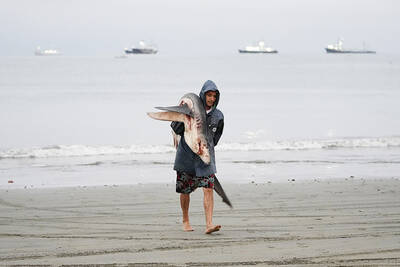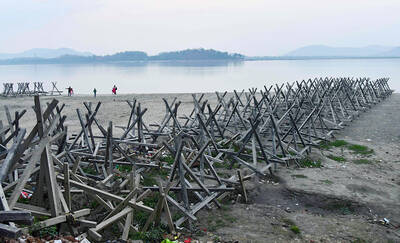WikiLeaks frontman Julian Assange is planning to run for election to the Australian Senate, the organization announced yesterday on Twitter.
Assange, an Australian citizen, is on bail awaiting a British court decision on his appeal against extradition to Sweden on sexual assault allegations.
He strongly denies the claims, saying they are politically motivated and linked to the activities of WikiLeaks, which has published thousands of confidential documents on the Internet.
WikiLeaks said it appeared that the 40-year-old’s current legal situation did not rule him out of running for Australia’s upper house.
“We have discovered that it is possible for Julian Assange to run for the Australian Senate while detained,” WikiLeaks said on Twitter. “Julian has decided to run.”
WikiLeaks said it will also field a candidate to run directly against Australian Prime Minister Julia Gillard in her lower-house electorate of Lalor, Victoria, in the elections, which are due next year.
“The state Julian will run for will be announced at the appropriate time,” WikiLeaks said.
The Australian government has previously blasted WikiLeaks, with Gillard describing its release of US diplomatic cables as “grossly irresponsible.”
Gillard’s government ordered Australian police to investigate whether WikiLeaks had broken Australian law, but they said in 2010 it had not broken any under their jurisdiction.
Assange, a former computer hacker, is fighting being sent to Stockholm because he fears it would open the way for his extradition to the US to face charges of spying, linked to the leaking of classified military documents by US soldier Bradley Manning.
Manning has been formally charged for allegedly turning over a trove of classified US documents to WikiLeaks.

WAKE-UP CALL: Firms in the private sector were not taking basic precautions, despite the cyberthreats from China and Russia, a US cybersecurity official said A ninth US telecom firm has been confirmed to have been hacked as part of a sprawling Chinese espionage campaign that gave officials in Beijing access to private texts and telephone conversations of an unknown number of Americans, a top White House official said on Friday. Officials from the administration of US President Joe Biden this month said that at least eight telecommunications companies, as well as dozens of nations, had been affected by the Chinese hacking blitz known as Salt Typhoon. US Deputy National Security Adviser for Cyber and Emerging Technologies Anne Neuberger on Friday told reporters that a ninth victim

Russia and Ukraine have exchanged prisoners of war in the latest such swap that saw the release of hundreds of captives and was brokered with the help of the United Arab Emirates (UAE), officials said on Monday. Ukrainian President Volodymyr Zelenskiy said that 189 Ukrainian prisoners, including military personnel, border guards and national guards — along with two civilians — were freed. He thanked the UAE for helping negotiate the exchange. The Russian Ministry of Defense said that 150 Russian troops were freed from captivity as part of the exchange in which each side released 150 people. The reason for the discrepancy in numbers

A shark attack off Egypt’s Red Sea coast killed a tourist and injured another, authorities said on Sunday, with an Italian Ministry of Foreign Affairs source identifying both as Italian nationals. “Two foreigners were attacked by a shark in the northern Marsa Alam area, which led to the injury of one and the death of the other,” the Egyptian Ministry of Environment said in a statement. A source at the Italian foreign ministry said that the man killed was a 48-year-old resident of Rome. The injured man was 69 years old. They were both taken to hospital in Port Ghalib, about 50km north

POWER PLAY: The dam is planned to more than triple the 88.2 billion kilowatt-hours designed capacity of the Three Gorges Dam, which is currently the world’s largest China has approved the construction of what would be the world’s largest hydropower dam, launching an ambitious project on the eastern rim of the Tibetan plateau that could affect millions downstream in India and Bangladesh. The dam, which would be in the lower reaches of the Yarlung Zangbo River, could produce 300 billion kilowatt-hours of electricity annually, according to an estimate provided by Power Construction Corp of China in 2020. That would more than triple the 88.2 billion kilowatt-hours designed capacity of the Three Gorges Dam, currently the world’s largest, in central China. The project would play a major role in meeting China’s